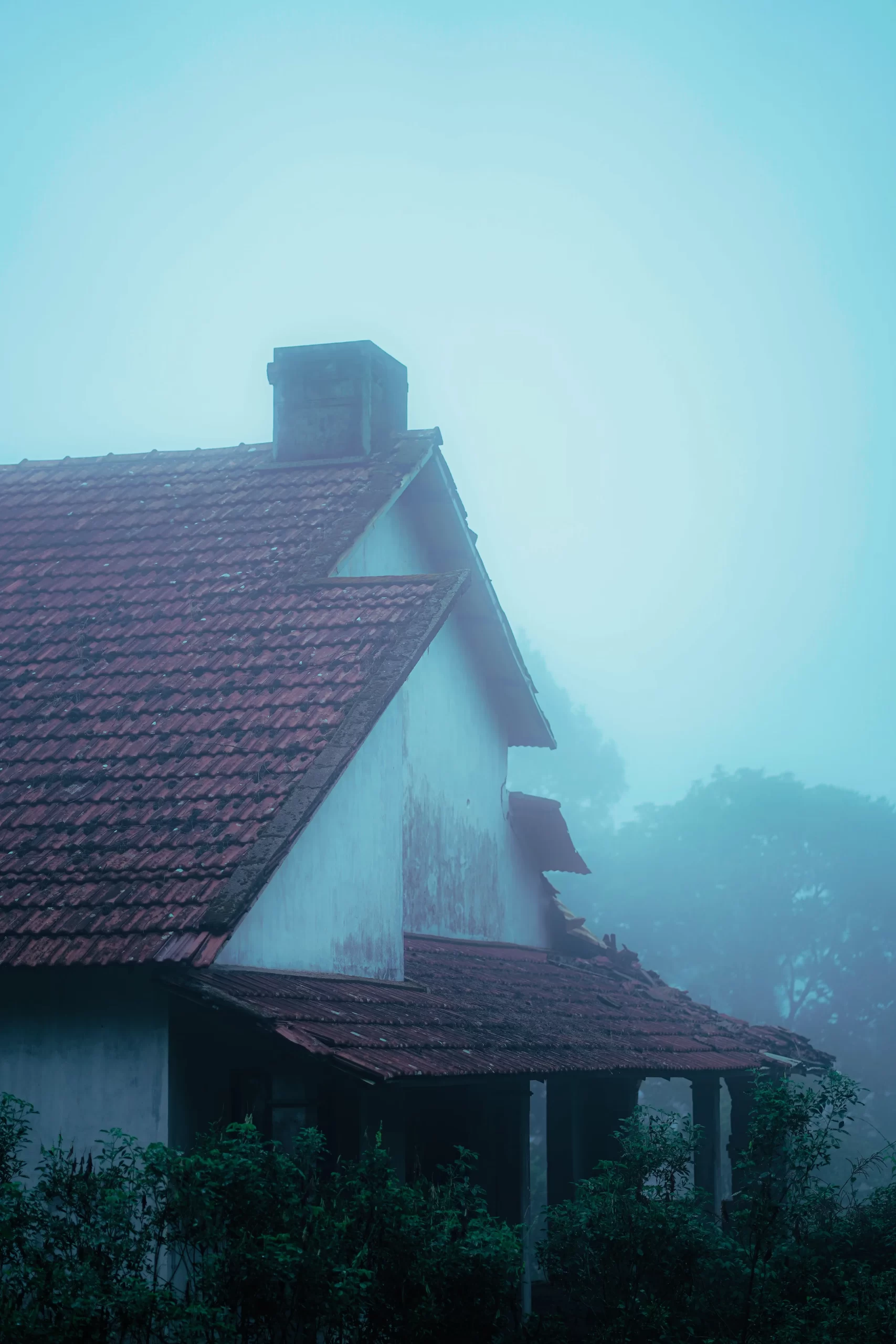It has taken me a month to gather the courage to come here. It would require even more courage to enter through the gate, to stand in the lawn, to breathe the air infused with the scent of pine, and sometimes, eucalyptus. Do I have the nerve? Would I be able to take it? After twenty years?

All these years, the memories of this place had given comfort to my mind, with the vision of a fifteen-year-old me breezing past this gate every day, and sometimes, many times a day. It was as if I owned the place instead of the old lady whom I called Granny. This was Granny’s house. She wasn’t my grandmother, not even a relative, but the perception of home and family overflowed from my home to this one. At that time, it never occurred to me how it would feel like to live alone, like Granny did, her husband long dead, and her son and his family living in another city. My home, across the road, had a large family, but I felt suffocated at times. At home I constantly had to prove myself. But with Granny, I felt free; I felt like smiling.
My family had happened to move to another city the same year that Granny had died. In my mind, the place had remained frozen in time. That advertisement, the one that I happened to see a month ago, changed all of that. It stabbed me somewhere inside. The house had been converted into a hotel. The house had always been a beauty, and for modern times, the old charm would be inviting. I’ve driven three hundred miles, carrying the pain with me, not knowing whether I was coming her for a solution to the pain, or for more agony. But here I am, standing before the wooden gate. It used to be a different shade of yellow, I’m sure.
A guard in uniform is coming up. He is opening the gate. “Good afternoon, ma’am. Would you like a room here?”
“Can I first take a tour of the…”
I gulp hard. Hotel? Resort? I do not want to use these atrocious words for the place; I can’t. I look through the guard.
I am ushered in, nevertheless.
I look around.
I choke, almost.
It is an August afternoon, crisp and bright, just like in my memories. The large square lawn still has the indigenous variety of grass, dark green and patchy. It makes a husky sound when you walk on it. The cedars on three sides of the lawn are the same – tall, conical and sturdy. Diagonally arranged, half-embedded bricks that outline the lawn had always had those patches of moss – wet in the summer and sand-dry in autumn. Beyond the brick edging are the pink lilies and the red salvias. I feel the wet velvety touch of the lily petals on my fingertips. I look at my hand for the yellow pollen dust that invariably makes its appearance every time you touch a lily.
“This way, Ma’am.”
I look at my pollen-less fingers. No one had interrupted, not even Granny, when I sat in the lawn for hours, registering in my soul, everything that was around – the lilies, the trees, the ants, the butterflies and the weeds. The disruption shoves me into the present, and I see metal chairs and tables under blue and yellow garden umbrellas, right in the middle of the lawn. There is also an orange-coloured garden swing in a corner. All these things look so harsh on the lawn, so alien.
The porch has been turned into a ‘reception’. The woman in a business suit at the desk is an intruder. What is she doing here, behaving as if she owns the place? She doesn’t know a thing! I feel anger building up inside me. Can she take me to the plum tree in the backyard that yields the most fruit? I bet she can’t. Yet, she stands here, ‘introducing’ me to the place, as if that was possible!
I hesitate for a moment, but then I ask about the owner of the ‘hotel’. The website does not mention this. I had assumed someone had bought this place and set up a business here, but the answer makes me feel nauseated.
Natasha! No! God, no! She didn’t give a damn about this place, she never did. She was always in a temper when she visited for a couple of days every year, grumbling ceaselessly about this ‘old house in a remote place’. How could Granny have left the property to her? I feel an irresistible need to take the first left from there, barge into Granny’s kitchen, and ask her why she should have done this. I have no right to do that, however, even if Granny was alive. Natasha is the legal heir, but this place is not just brick and cement; it has Granny’s soul in it, in everything that lies here. And her soul is at risk of being wounded, or so I feel.
I insist upon seeing around before taking a room. I have to pretend to be a prospective guest, but the need to take permission makes my gut twitch in the same way it felt when I had to apologize to the neighbours for something I did not do. I was a child then, but more than my mom, it was Granny who could restore my smile.
I drift along the corridor. Textured paint creeps up the walls and glossy varnish claws onto the wood of the old windows. The oak wood chest, the walnut Chippendale chairs, the oval mirror with the carved frame, even the large box with ornamented handles, everything looks sad, captive. A couple, probably on honeymoon, is getting clicked in front of the mirror. I have seen only Granny around these objects. I feel a deep hollow at the bottom of my lungs as if something is clasping my lungs, preventing breathing.
I’m led to a ‘deluxe room’. But I’m standing in the living room, or what used to have that name. The four-poster bed, with a shallow crack in one of the legs, has been dislocated to this room. My eyes instinctively search for the mantelpiece. It is there. There are photo-frames on it, and the brass candlestand too. The hollow under my ribs is now traveling upwards, and my mouth feels dry. I step towards the photos. My eyes are stone dead. I forget to breathe. Granny and her husband’s wedding photo in black and white, is still there. Why is it still there? That is violation. Don’t dead people have a right to privacy? I want to grab the photo frame and to take it to a place more private. I cannot. I have no right over this place.
I have no right over this place? This thought never occurred to me while helping Granny arrange her closet, her arthritic fingers unable to fold the clothes. Did she ever think of me as an outsider? She couldn’t have. I did not have any such feeling when I had spent the night putting wet towels on Granny’s forehead till a doctor could be called in the morning. I melted into the place when I was here, in the same way as Granny’s presence merged with every bit of this place. How we, a young girl and an old woman, vibrated to the rhythm of this house! Yet now, a stranger was chopping, slashing, twisting this entity, and the ‘home’ was bleeding.
My thoughts begin to smother me. I tighten my grip over my handbag handle. My sweaty palms don’t let me do that.
I cannot take it anymore. I run out of the room, leaving the attendant behind, and the door hinges make one of those familiar sounds. I stagger in the corridor. I don’t know where I want to go, but I know I am heading to the backyard. The yearning to sit on the low branches of the apricot tree rises in me. I can smell the freshly bitten raw apricot, sour at first and slightly bitter as you chew it. The half-ripe ones have that crunch…
What’s this? The spacious backyard is now separated by a low wall with stencilled patterns. They are ugly. More of orange, yellow and blue mutilating the greens and the browns. I go around the wall and enter the backyard. I close my eyes, fearful of what I might see. I sense there are people around. I open my eyes. A man and a woman are sitting on a bench, busy in conversation, while their little boys are running around.
“You have a large house, Granny. If you were not living here, what would you want this place to be?”
There was a smile on the thin lips and a twinkle in the sunken, grey eyes, “A home for little children who never had a home or a family. The house has given me more than enough. If I have to give back something to this house, I would give it the most beautiful thing in this world, children’s laughter.”
I look at the two boys. I am hoping to hear the echo of their laughter. They shriek with excitement as they discover a bed of gravel at the foot of the walnut tree. They pick up the stones, one by one, and start aiming at a log laid out in the clearing between the trees. Every time a stone hits the log, they yell in excitement. Their parents are not interested. Wait! Is it the log? Yes, it is! I should go forward and stop this, but I feel drained of energy.
What is the log doing here? Here, in the open? It was so difficult to say farewell to the tree, an old companion, but the roots of the tree were damaging the veranda wall. When the tree was being felled, Granny had plugged her ears and had switched on the music, as if that could prevent the sound of the saw from reaching her. She had cried. She had. We had planted a new tree in memory, but what would Natasha understand of it? To her, the log must be nothing more than adornment, ‘country-style’. It has been dragged and made to sit in the middle of the ground, to be ogled at.
This place had life once. Does it still have a spirit?
Oh no! Why did I imagine this? I think I can hear the despair. The muffled sadness is becoming audible to me. The sounds are rising, like smoke, from every object in the house. No! No! I can’t take it! I stumble back through the corridor, across the reception, into the front lawn.
I need my breath back, but first I must cry.
I am unable to cry.
I stride to the far corner of the lawn, away from the house, to the edge of the lawn overlooking the valley. The mountains in the distance look hazy. I need a few minutes, personal minutes. I look over my shoulder. The attendant is not coming towards me. He stands there, far away, looking at me, perhaps realising that I should be left alone for some time. He looks familiar, like an older version of the guard who used to patrol our street.
I sit down on a large rock near the salvia bed. I look down at the flowers. In the centre of the mass of green and red, a yellow sow thistle is facing me. It is beautiful and glorious, like the sun, but officially, it is a weed. The plant does not mind the branding, though. It will bloom wherever it happens to root. That’s its temperament and no number of salvias can change that.
I see myself and Granny sitting on garden chairs at this corner of the lawn, conversing, even in the silent interludes. I can see her face glowing as she told me stories from her younger days. I can see the deep sadness in her eyes as she shared fragments from the most difficult parts of her life. I can see myself, a young girl, hardly interested in Granny’s stories; they seem ancient and irrelevant. But I also see myself listening, wondering how different her world had been.
Oh…I am beginning to feel a…what should I call it, a revelation? How could I not realise it in at that time! The act of sharing painful memories has its sanctity; the listener must be qualified enough. There has to be a connection. I was also too young to realise that suffering is a treasure. It has the key to the secrets of life. And Granny…she had many of those precious gems.
I close my eyes. Scene upon scene from the past float in front of my eyes. The conversation about Granny losing her other son, about her husband being sent to a war assignment, about the pimple that propped up on her cheek right on the wedding day! We had laughed, and we had cried. We had connected.
I feel overwhelmed, joyous, in a strange way.
I open my eyes. The air around me seems clearer. How could I have been oblivious to this…all these years? As if suddenly, I know where the wisdom in me came from. I can now see the invisible hand that had been holding mine.
I had been the one. I had been the recipient.
I skip a breath. I look at the mountains in the distance. The mist over them is still there but I imagine that I can make out the hidden contours.
Near my feet, an ant is lying on its back in the soil, paddling the air with its legs, trying to turn over. How did it manage to get into this trouble, I wonder? Where was the need? I pick up a twig and slide it underneath the ant as delicately as I can. I push it lightly and the ant is back on its feet. It moves away in haste, as if trying to make up for the lost time.
I can feel energy running in my veins. I can feel every muscle of my body relax. I know I am smiling. I get up from the rock and turn around to face the house. The building of brick and cement and wood seems to melt into creation, just like Granny’s existence.
I leave.
19, Cedar Street will always be loved no matters who tampers with it. I have my inheritance – it lives inside me.
Abha Sharma is an author and life coach living in India. Her work includes The Night of Fear, a novel, and three non-fiction books in The Making of the Greatest series -Warren Buffett, Jack Ma and Mark Zuckerberg, all published by Rupa Publications India. She has over sixteen years of experience as an editor, writing coach and freelance trainer.







Leave a Reply